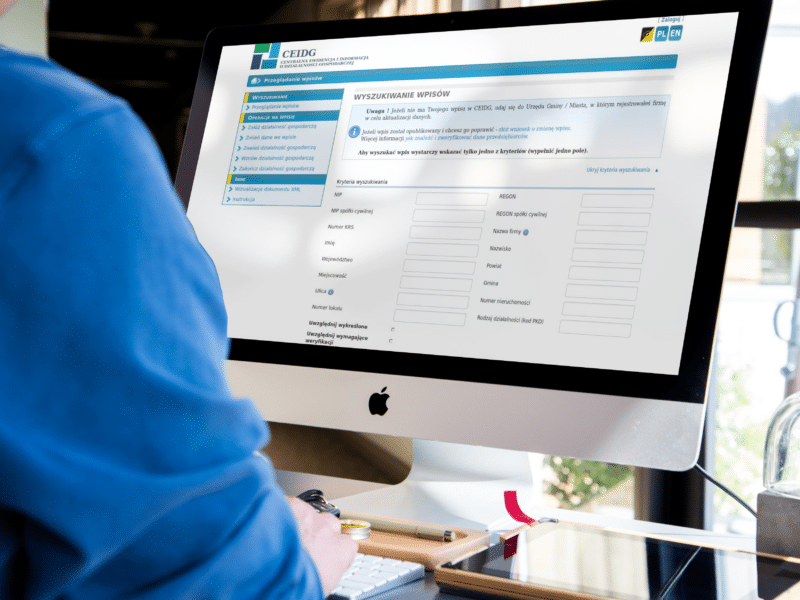In the first quarter of this year, the CEIDG registry received over 6% fewer applications for starting a sole proprietorship compared to the same period last year. In nearly half of the cases, the province of business activity was not specified, which is a convenience for some entrepreneurs. During the same period, the number of applications for business resumption increased by over 9% year-on-year. According to experts, better conditions in these areas are expected in the coming months.
According to data provided by the Ministry of Development and Technology (MRiT), approximately 75.3 thousand applications for starting a sole proprietorship were submitted to the CEIDG registry in the first three months of this year. This is 6.1% less compared to the same period last year, when there were over 80.1 thousand such cases. Piotr Soroczyński, Chief Economist of the National Chamber of Commerce (KIG), attributes this decline to several factors. One of them is the demographic situation. The number of working-age people is decreasing, so the population of potential business founders is not growing as it used to. Additionally, the past year has been very challenging, resulting in fewer encouraging signals to start a business than usual.
“The current situation is not conducive to starting businesses due to significant operating costs. High inflation, which is effectively a hidden tax, along with rising minimum wages and higher social security contributions, has dampened the enthusiasm for submitting such applications. There is uncertainty, everyone is waiting for improvement, and hope is provided by EU funds, among other things,” comments Adrian Parol, a legal counsel and restructuring advisor.
Dr. Jakub Rybacki, head of the macroeconomics team at the Polish Economic Institute (PIE), believes that the weaker results in Q1 are due to several reasons. The greatest weakness is linked to the construction sector, due to the housing market slowdown after interest rate hikes. This effect, however, is starting to fade. Additionally, the weaker performance of the IT and financial sectors is significant, which is directly related to poor economic conditions and fewer orders from Europe. Similar trends are observed in the industry, where energy prices create additional problems. According to the expert, against this backdrop, inflation or the adjustment of social security contributions are relatively minor challenges. The rising minimum wage is also not a major issue for most sole proprietors, who typically earn more.
“Raising the minimum wage is a problem for entities recruiting candidates with low professional qualifications. The work of such individuals becomes a significant cost for companies to justify at today’s prices. In some sectors, we are close to the demand barrier. Offered goods or services are becoming too expensive for customers to accept. This is also a factor that reduces the willingness of potential entrepreneurs to start businesses,” adds the Chief Economist of KIG.
Over 34.6 thousand of the aforementioned applications concerned businesses that did not specify the area of activity (compared to 33.9 thousand a year earlier). Analyzing data by provinces, the most applications were related to Mazowieckie – about 7.5 thousand (compared to about 8.3 thousand in Q1 last year).
“This is not about a reluctance to provide information about the place of business. Entrepreneurs do not have to do this according to current regulations. For some, it is a convenience, and more and more registrants are taking advantage of this solution,” emphasizes Piotr Soroczyński.
The ministry’s data also show that in Q1 this year, the CEIDG registry received 45.3 thousand applications to resume a sole proprietorship. This is 9.2% more than from January to March 2023, when nearly 41.5 thousand such cases were registered. According to Adrian Parol, this increase indicates better sentiment among entrepreneurs. They are hopeful for an improvement in the situation due to changes in government, as well as economic and foreign policies. The expert also believes that the noticeable stabilization of inflation, which significantly hindered business operations, has influenced these figures.
“An increase in resumed businesses is primarily a sign of improved economic activity. REGON data from GUS indicate that this is largely due to commercial, industrial, and educational entities. This is a direct result of higher consumer spending by households,” analyzes Dr. Rybacki.
Piotr Soroczyński points out the different economic conditions in the analyzed periods. In Q1 2023, we were in the middle of the most challenging period for entrepreneurs, with year-on-year GDP being negative. Entrepreneurs were therefore applying to suspend their activities, knowing they would not be able to meet market conditions. However, there has been more hope recently, and the economy is gradually improving. This is also reflected in the number of applications to resume business operations.
“In the coming months, there will definitely be more openings and resumption of sole proprietorships than recently. This can be expected primarily in more industrialized provinces. Considering the sectors, growth is expected in services related to construction,” forecasts Adrian Parol.
Dr. Jakub Rybacki also states that the coming months should favor a higher number of applications for opening and resuming suspended businesses. The PIE expert believes that 2024 will likely be significantly better than 2023. He adds that so far, mainly service companies have been increasing, while the situation in industry and construction was weaker. Now, these two sectors should catch up, partly due to the improving housing market situation.
